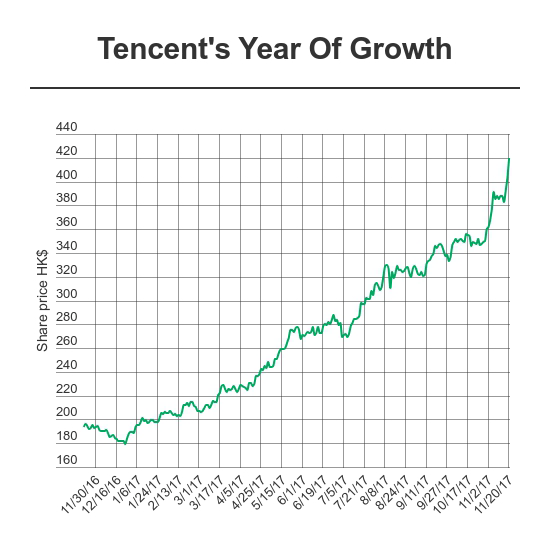Tencent has become the first Chinese company to have a value of more than $500 billion, marking a milestone for the nation and for the technology sector at large.
The company which is listed on the Hong Kong Stock Exchange, reached HK$418.80, giving it a market capitalization of HK$3.99 trillion which passes the $500 billion mark. The news comes a week after Tencent posted a profit of $2.7 billion on revenue of $9.8 billion for Q3 2017.
In the last twelve months alone, the company's share price has doubled thanks to its earnings reports like Q3. And overall profit was up 69 percent year-on-year, with revenue rising by 61 percent, boosted by Tencent's games business.
Tencent's valuation surpasses its closest rival in China, Alibaba, which is valued at $474 billion. And as China’s first $500 billion technology giant, it also leaped past Facebook.
The half-a-trillion-dollar club in the tech business includes Apple, Alphabet, Facebook, Microsoft and Amazon.

Tencent’s market cap has more than tripled since March 2014 when it reached $150 billion. At that time, it surpassed Intel in the process.
WeChat, its messaging app that is China’s top social service, is closing in on one billion users. But most of that users came from its own country. WeChat struggled to replicate that success overseas.
But it's Tencent's gaming business on PC and mobile that sits at the core of the company's revenue, accounting for $5 billion in the last quarter alone, thanks to smash hits like Honour Of Kings, which was 2017’s top grossing game, and the acquisition of Supercell's Clash Of Clans.
The company has also bought up stakes in public companies like Tesla and Snap, and invested in India-based unicorns Flipkart, messaging app Hike, health portal Practo and Uber's rival Ola. Other earlier-stage deals investments include flying cars, lunar drones and asteroid mining, while longer-standing investments like Sogou and China Literature.
The rise of China's technology companies is also the result of China's restriction to most foreign competitors, like Facebook, Twitter, YouTube and Google Search.